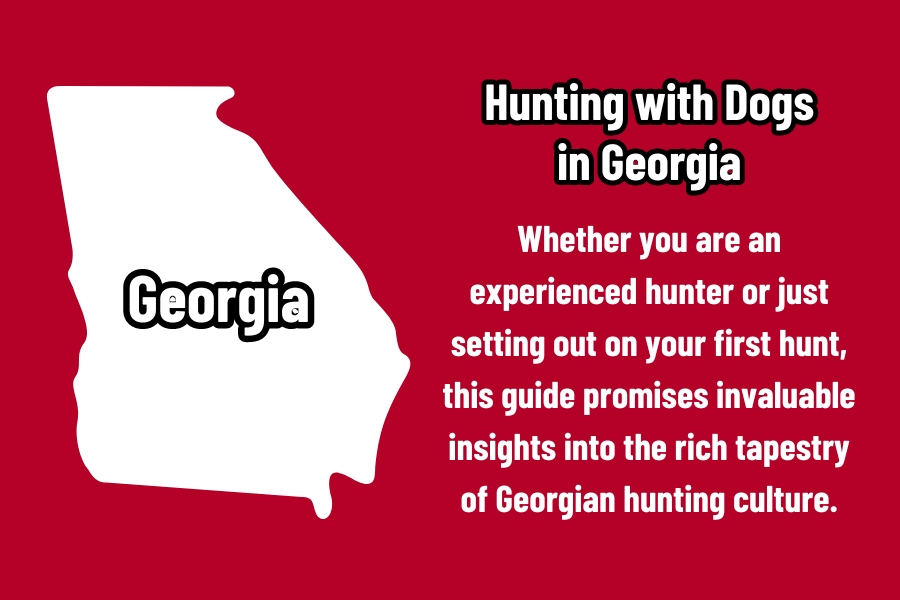Hunting with dogs in Georgia offers an all in one guide to help navigate local regulations and opportunities for big game, small game, feral hogs, migratory birds and unprotected species. Discover essential tips, best practices, and insights for every hunter, whether novice or experienced.
Introduction
Picture the crisp, early morning air in Georgia’s vast woodlands, the kind that refreshes the soul and sharpens the senses. There, among the whispering pines and rolling hills, a unique bond forms between hunter and dog. Hunting with dogs in Georgia isn’t just a pastime; it’s a profound tradition that echoes through generations, connecting us to the land and to our heritage. It’s that pulse of excitement as your best hunting dogs eagerly track the scent, and the thrill of the chase that follows, which cements the passion for this enduring sport.
You understand the allure—how the eager barks and the rustle of leaves underfoot blend into a symphony that signifies more than just the hunt; it represents camaraderie and respect for nature’s bounty. Whether you are an experienced hunter or just setting out on your first adventure with a canine companion, this guide promises invaluable insights into the rich tapestry of Georgian hunting culture. Let’s begin our journey, uncovering the rules, opportunities, and joys of hunting with dogs in Georgia.
Hunting with Dogs in Georgia: Understanding Regulations
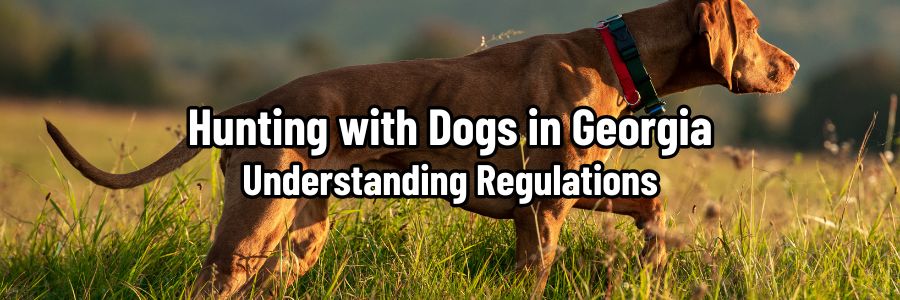
A hunting journey with your canine companion in Georgia requires a clear understanding of the local regulations to ensure a legal and ethical adventure. This guide serves as your comprehensive resource, detailing the rules and procedures that govern hunting with dogs in Georgia. From the dense forests of the north to the sweeping coastal plains, knowing these guidelines is essential for every hunter looking to honor the tradition and spirit of the hunt.
Hunting with Dogs: General Requirements
In Georgia, every dog used in hunting must carry identification including the hunter’s name, address, and telephone number. Outside of designated hunting or training seasons, or outside specific areas, all dogs must be confined or leashed. This regulation ensures both the safety of the dogs and the conservation of wildlife across the state.
Deer Hunting Regulations with Dogs
While generally restricted, running deer with dogs is permitted in certain areas under strict conditions. Specifically, deer hunting with dogs is allowed only in select counties, with a permit required for either leased properties of at least 1,000 contiguous acres or private properties of at least 250 acres. Permits, which are restricted to one per property, must be applied for at least 30 days before the season starts. The permit details, including the number, must be clearly displayed on all dogs and vehicles used in the hunt.
Bear Hunting Regulations with Dogs
Regulations for bear hunting with dogs are particularly specific, varying significantly across different Wildlife Management Areas (WMAs) and zones. For instance, in the Chattahoochee and Chestatee WMAs, the use of dogs is permitted under defined conditions. The training seasons for these areas are also distinctly set, emphasizing the importance of adhering to the schedules to avoid penalties. Running bears with dogs in unauthorized areas is strictly prohibited, underscoring the need for hunters to be well-informed about the boundaries and rules of their chosen hunting locations.
Feral Hog Hunting Regulations with Dogs
The rules for hunting feral hogs with dogs in Georgia differ significantly between private and public lands:
- On Private Property: Hunters are free to use dogs year-round without specific restrictions, including the use of lights at night and the choice of weapons.
- On WMAs, VPAs, and State Park Properties: The use of dogs is restricted to certain seasons that align with other game hunting periods. Weapons and hunting methods must comply with the regulations applicable to the specific season.
Small Game Hunting Regulations with Dogs
Regulations for small game hunting with dogs also vary:
- On Private Property: Dogs can be used to hunt various species such as quail, grouse, and rabbits, with specific seasons set by the state. Notably, raccoons and opossums have no bag limits, but like rabbits there are restrictions on the types of dogs that can be used for hunting.
- On WMA, VPA, and State Park Properties: Regulations for hunting with dogs on public lands are aligned with the state-designated seasons and may include additional restrictions based on the particular WMA.
Migratory Game Bird Hunting Regulations with Dogs
Hunting with dogs in Georgia encompasses various migratory game birds and waterfowl, each with specific seasonal regulations on private property or public lands.
- On Private Property: Utilizing dogs to hunt migratory game birds such as ducks, geese, and brant is permissible, but hunters must strictly adhere to waterfowl regulations and season dates. Other species like common (Wilson’s) snipe, coot, and woodcock can also be hunted with dogs within their respective seasons. Crow hunting with dogs is allowed during the crow season, while doves and gallinules, although commonly hunted with dogs, require adherence to specific area regulations. Sora and rails are permissible with the assistance of dogs during their open seasons.
- On WMA, VPA, and State Park Properties: Similar regulations apply as on private property, but hunters should always check for specific area rules that might restrict hunting methods or the use of dogs. For example, duck and goose hunting is often allowed on designated areas of WMAs with specific restrictions during the waterfowl season. Hunting for snipe, coot, and woodcock with dogs is generally allowed as long as it aligns with other hunting activities and seasons on these lands. Hunting crows and doves with dogs is permissible, observing area-specific regulations and during their respective seasons. Gallinules, sora, and rails can also be hunted with the use of dogs, subject to specific WMA and state park regulations during the open seasons.
Unprotected Species Hunting Regulations with Dogs
In Georgia, several species are classified as unprotected, including coyotes, armadillos, groundhogs, beavers, starlings, pigeons, English sparrows, and nutria. There is no closed season or bag limit for these species, and electronic calls may be used specifically for hunting coyotes. Dog-assisted hunting is permitted for these unprotected species, allowing hunters to manage populations and protect property without the constraints of stricter game laws.
Training Dogs on Private Land – Regulations
On private land, individuals training dogs for hunting must hold a valid Hunting License unless the training occurs on their own land or that of an immediate relative. There is no closed season for training dogs on private properties. However, it is unlawful to possess firearms (except handguns with blank or shot cartridges), axes, climbers, or other equipment for taking game while training hunting dogs.
Shotguns loaded with No. 6 shot or smaller may be used while training pointing, flushing, and retrieving dogs with pen-raised quail and pigeons, provided the trainer maintains proof of purchase for the pen-raised birds. It is prohibited to run deer with dogs or to take game by any means while training hunting dogs, except during open seasons for such activities.
Training Dogs on WMAs & National Forests – Regulations
Training dogs on WMAs and National Forests in Georgia is permitted when a WMA has an open season for small game or furbearer. Specific WMAs allow furbearer dog training from August 1-14 and March 1-19, except as noted in area-specific listings. Hunters looking to train their dogs should look for these symbols in specific WMA listings:
- B – Bird dog training allowed
- F – Furbearer dog training allowed
- R – Rabbit dog training allowed
About Regulations
The above sections are key regulations for hunting with dogs in Georgia. Keep in mind all regulations and details are not included. For the most current and detailed information, always refer to the Georgia Department of Natural Resources (GDNR) to ensure full compliance.
Hunting Big Game In Georgia
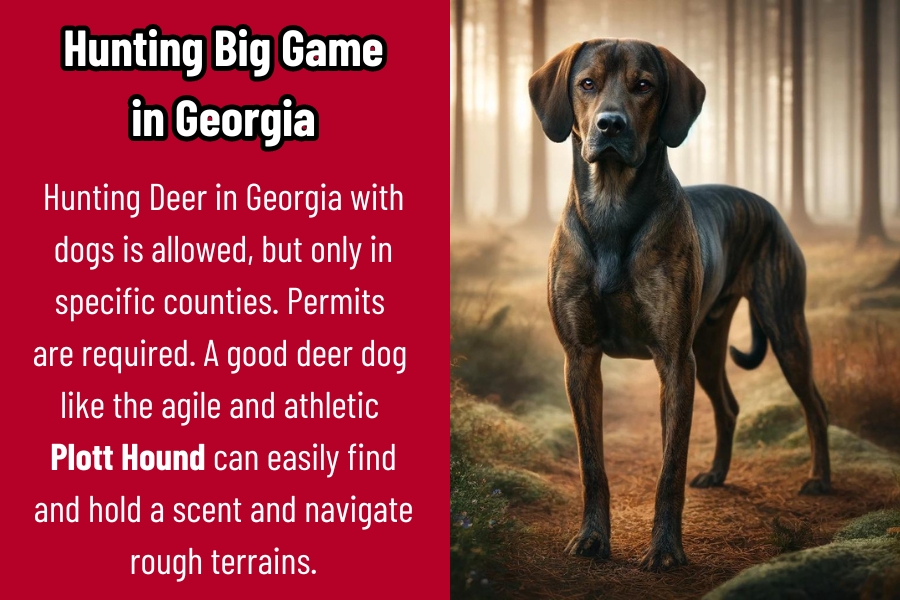
Exploring the rugged landscapes and rich ecosystems of Georgia opens up a world of opportunities for those seeking the thrill of hunting big game in Georgia. This section dives into the essentials of hunting deer, bear, and turkey in the Peach State, offering a blend of fascinating facts, habitat insights, and guidelines.
Hunting Deer in Georgia
Deer hunting is a cornerstone of Georgian culture, deeply rooted in the state’s history and a favorite among local and visiting hunters alike. The diverse habitats, from the mountainous north to the coastal plains, provide ample opportunities for those pursuing these majestic animals.
- Habitat and Licenses: Deer thrive across Georgia’s mixed forests and agricultural lands, adapting well to the varied landscapes. Hunters need a valid Georgia hunting license and a deer hunting permit.
- Seasons and Bag Limits: The deer hunting season generally runs from mid-October to January, varying slightly by region and hunting method. Bag limits are also set by region, allowing hunters to harvest a generous number of deer each season.
- Can dogs be used?: Hunting with dogs in Georgia for deer is allowed, but only in specific counties under strict regulations to ensure safety and conservation. Permits are required, and hunters using dogs must adhere to additional local rules.
Hunting Bear in Georgia
Bear hunting in Georgia offers an intense and rewarding challenge. The state’s bear population is primarily concentrated in the North Georgia mountains, as well as in the central and southern forests, where they roam the expansive wilderness.
- Habitat and Licenses: Bears are commonly found in the large, contiguous forests that provide them with ample cover and food. Hunters must possess a valid hunting license and a bear permit.
- Seasons and Bag Limits: Bear hunting seasons are typically brief, occurring during the fall months. This limited season helps manage the bear population sustainably while giving hunters a fair chance at success.
- Can dogs be used?: Yes, dogs are permitted in bear hunting but only in designated areas such as certain Wildlife Management Areas (WMAs) and under specific conditions that may include season dates and area restrictions.
Hunting Turkey in Georgia
Turkey hunting is a popular springtime activity in Georgia, celebrated for its traditional calling techniques and the vibrant display behaviors of the turkeys during the season.
- Habitat and Licenses: Wild turkeys are found throughout Georgia’s forests and fields, with a particularly strong presence in areas that offer a mix of open and wooded land. Hunters require a standard hunting license and a turkey permit.
- Seasons and Bag Limits: The turkey hunting season generally spans from late March to mid-May, capitalizing on the mating season when turkeys are most active. Bag limits are designed to sustain the robust turkey populations while providing ample hunting opportunities.
- Can dogs be used?: Dogs are not allowed.
Each of these species offers unique hunting challenges—enjoy the silent stalks in bear and deer hunting to the strategic calls of turkey hunting.
Hunting Feral Hogs in Georgia
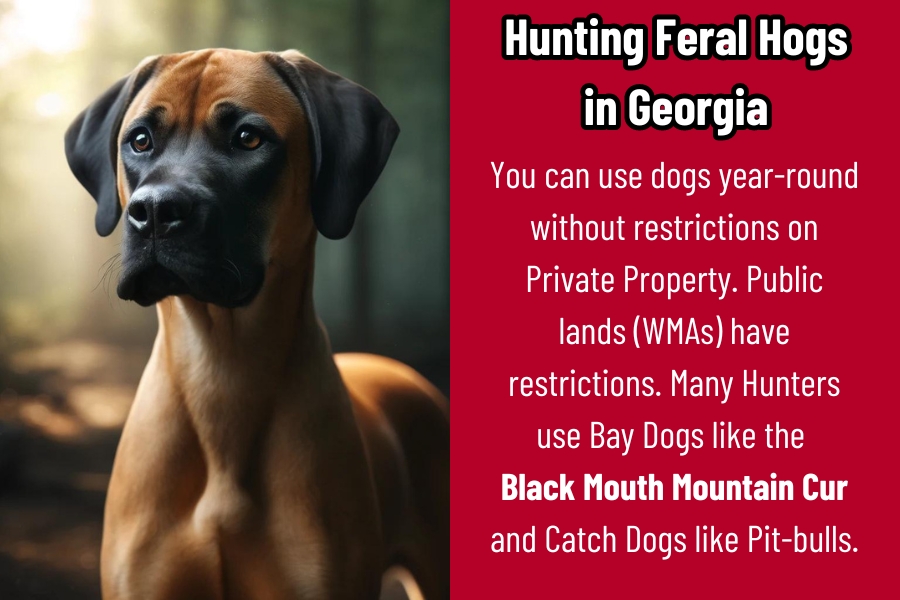
The challenge of hunting feral hogs in Georgia is both a thrilling pursuit and a vital management tool to control the rapidly growing populations that threaten local ecosystems. Feral hogs, known for their adaptability and resilience, can be found in a wide range of habitats across the state, causing significant agricultural and environmental damage. Lets talk about the specifics of hunting with dogs in Georgia for these robust creatures on both private and public lands.
Hunting Feral Hogs on Private Property
Feral hogs can be hunted year-round on private properties in Georgia, which offers landowners and hunters considerable flexibility to manage populations. These animals are highly adaptable, thriving in diverse environments from river bottoms to agricultural fields, where they often root up the ground in search of food.
- Habitat and Licenses: No special license beyond a standard Georgia hunting license is required to hunt feral hogs on private land.
- Seasons and Bag Limits: There are no closed seasons or bag limits on private land, giving hunters the opportunity to hunt these invasive animals throughout the year.
- Can dogs be used?: Yes, dogs are widely used and highly effective in hunting feral hogs on private property. They are essential for tracking and holding hogs until the hunter can arrive, making the hunt both more efficient and exciting.
Hunting Feral Hogs on WMAs & National Forests
While the general flexibility to hunt feral hogs exists on private land, regulations on Wildlife Management Areas (WMAs) and National Forests are stricter to ensure safety and environmental protection.
- Habitat and Licenses: Feral hogs are found in various habitats within WMAs and National Forests, from dense forests to swampy areas. A valid hunting license is required, and additional permits may be necessary depending on the specific management area.
- Seasons and Bag Limits: Hunting seasons and methods for feral hogs on public lands are typically aligned with other game seasons to minimize disruption and manage hunter density. This often means that hog hunting is allowed during small game or deer seasons, using the weapons and methods prescribed for that season.
- Can dogs be used?: The use of dogs in hog hunting on public lands is allowed but often restricted to certain times and places to coincide with general hunting seasons. Specific WMAs may allow the use of dogs under controlled conditions to help track and bay hogs, particularly in regions where hog populations are especially problematic.
Hunting feral hogs offers an adventurous outdoor activity that helps mitigate the impact of this non-native species on Georgia’s natural landscapes. Hunters using dogs play a crucial role in managing feral hog populations.
Hunting Small Game In Georgia
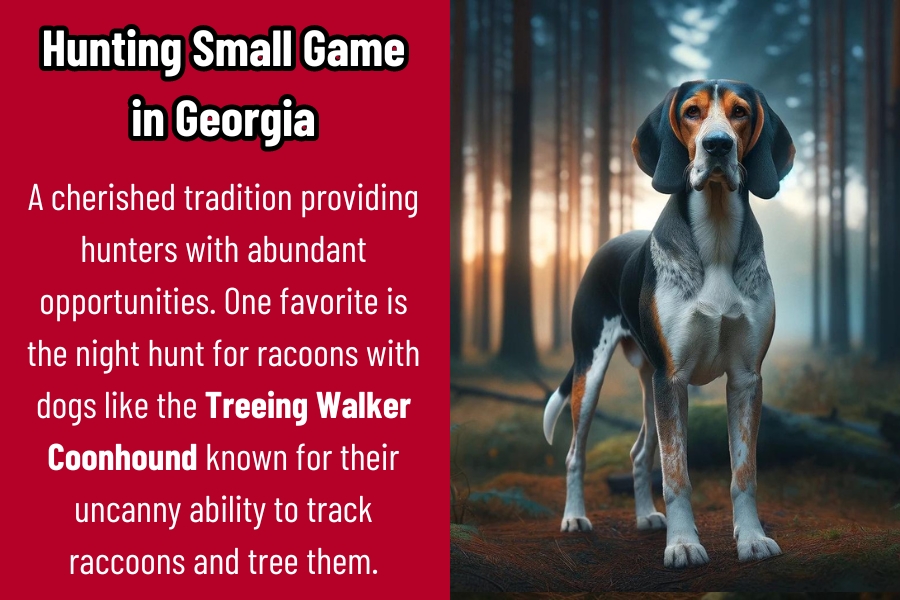
Hunting small game in Georgia is a cherished tradition in Georgia, providing both novice and seasoned hunters with abundant opportunities to hone their skills across the state’s diverse landscapes. This section explores the nuances of hunting various small game animals and the integral role that dogs play in each hunt.
Hunting Quail in Georgia
Quail hunting is a cultural staple in Georgia, celebrated for its fast-paced action and the deep-rooted traditions surrounding the hunt, such as the iconic image of hunters walking through brushy fields behind a line of pointing dogs.
- Habitat and Licenses: Quail thrive in the brushy, open woodlands and grasslands of Georgia. Hunters need a valid Georgia hunting license and a game bird license.
- Seasons and Bag Limits: The quail hunting season typically runs from November to February, with a daily bag limit that reflects management goals for sustainable populations.
- Can dogs be used?: Absolutely. Dogs, particularly pointers and setters, are essential in quail hunting for locating and retrieving birds.
Hunting Grouse in Georgia
Grouse hunting is less common but offers a challenging experience due to the bird’s elusive nature and the rugged terrain they inhabit.
- Habitat and Licenses: Grouse are found in the hardwood forests of North Georgia, particularly in areas with dense undergrowth.
- Seasons and Bag Limits: The season generally opens in October and runs through February. Bag limits are typically conservative to support conservation efforts.
- Can dogs be used?: Yes, dogs can be used to hunt grouse and are often critical for flushing grouse out of their dense habitat.
Hunting Rabbit in Georgia
Rabbit hunting is a popular winter activity, with the Eastern Cottontail being the most common species. It’s a social hunt, often involving groups of friends and family alongside a pack of beagles.
- Habitat and Licenses: Rabbits prefer areas with abundant cover like brush piles, thickets, and edges of fields. A standard hunting license is required.
- Seasons and Bag Limits: Rabbit hunting season typically extends from November to February, with no bag limit in many areas, providing ample opportunities for hunters.
- Can dogs be used?: Dogs, particularly beagles, are almost synonymous with rabbit hunting, using their keen sense of smell to track and flush rabbits.
Hunting Squirrel in Georgia
Squirrel hunting is an excellent way for young hunters to learn woodland skills. Both gray and fox squirrels are abundant and provide year-round opportunities.
- Habitat and Licenses: Squirrels are found in both hardwood and mixed forests throughout Georgia. A hunting license is required.
- Seasons and Bag Limits: The season for squirrel hunting is long, typically from August to February, with generous daily bag limits.
- Can dogs be used?: Yes, dogs, especially treeing breeds like the Mountain Cur, are used to locate and tree squirrels, making them easier to hunt.
Hunting Raccoon, Opossum, Fox, and Bobcat in Georgia
Night hunts for raccoon and opossum are a time-honored tradition in Georgia, while fox and bobcat hunts are more challenging due to their cunning nature.
- Habitat and Licenses: These animals are widely distributed across Georgia’s forests and farmlands. A hunting license and a predator and furbearer license may be required.
- Seasons and Bag Limits: These species generally have seasons that run from October to February, with specific night hunting provisions for raccoon and opossum.
- Can dogs be used?: Yes, dogs play a crucial role in these hunts. Treeing Walker Coonhounds, for example, are famed for their ability to track raccoons and tree them, while the American Foxhound for foxes and the Running Walker hounds for bobcat hunts.
In each case, hunting with dogs in Georgia not only enhances the experience but also increases the success rates of these traditional hunts.
Hunting Migratory Birds and Waterfowl in Georgia
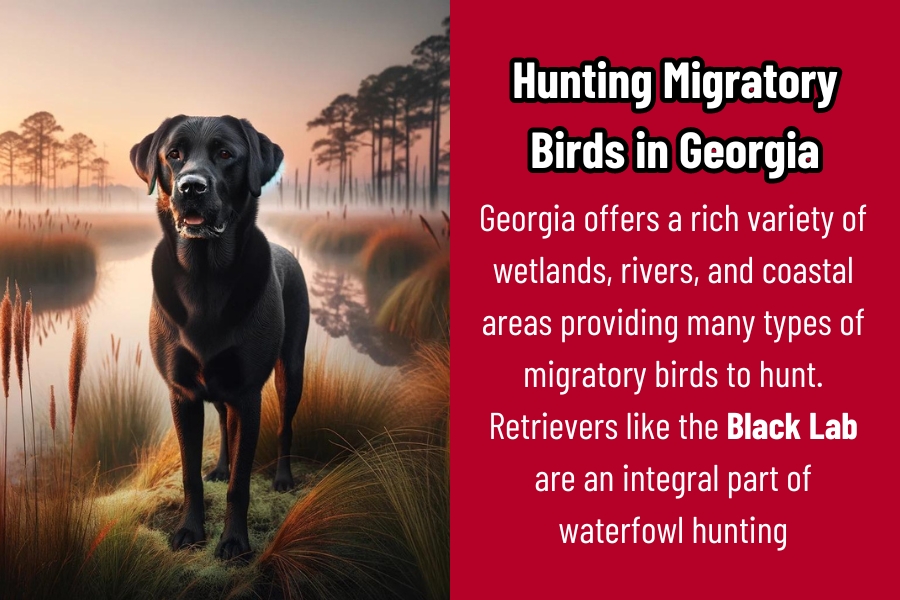
Georgia offers a rich variety of wetlands, rivers, and coastal areas. In this section we’ll discover why bird hunting with dogs in Georgia is a long standing tradition.
Hunting Ducks in Georgia
Hunting waterfowl in Georgia especially Duck hunting is a popular and a time honored tradition, with a variety of species migrating through the state each year. This diversity offers hunters the chance to experience and observe the different behaviors and habitats of these birds.
- Species: Hunters can target several species including the Mallard, Wood Duck, Pintail, Redhead, Scaup, and various types of Teal and Mergansers. Sea ducks like Scoter, Eider, and Long-tailed duck are also present but generally found in coastal areas. Note that the Harlequin Duck season is closed due to conservation efforts.
- Habitat and Licenses: Ducks are found in a variety of water bodies across Georgia, from small ponds to large lakes and coastal estuaries. A valid hunting license and a Georgia waterfowl stamp are required.
- Seasons and Bag Limits: Duck seasons are typically split into early and late seasons, with specific dates varying by year and zone. Bag limits are set annually based on species.
- Can dogs be used?: Yes, dogs (retrievers) are used for retrieving birds from water and thick cover. They are an integral part of duck hunting.
Hunting Geese in Georgia
Geese hunting provides an exciting challenge, particularly with the large flocks of Canada Geese that migrate through Georgia.
- Species: The primary species include Canada Goose, White-fronted Goose, and Snow Goose. The hunting of Brant Goose is currently closed to protect their populations.
- Habitat and Licenses: Geese prefer large open fields and bodies of water where they can graze and rest. Hunters need a Georgia hunting license and a federal duck stamp.
- Seasons and Bag Limits: Geese hunting seasons are generally set from fall to early winter, with specific dates and bag limits announced annually.
- Can dogs be used?: Dogs are commonly used in geese hunting to retrieve downed birds, particularly in difficult terrain or water.
Hunting Other Migratory Birds
For each of these species, the use of dogs can greatly enhance the experience of hunting migratory birds in Georgia.
- Common (Wilson’s) Snipe: These birds are known for their erratic flight patterns, making them a challenging target. They inhabit wet fields and marshy areas. Snipe hunting is allowed during specified seasons, usually in the late fall and winter.
- Coot: Often hunted along with ducks, coots are found in similar habitats. Their dark meat is less popular than other waterfowl, but they provide good practice for shooting.
- Crow: Crows can be hunted during specific seasons, and there are no bag limits. They are known for their intelligence and caution, presenting a unique challenge.
- Doves: Dove hunting is a popular opening season tradition in Georgia, celebrated with social gatherings and skilled shooting.
- Gallinules: These water birds, similar in habitat to coots, offer another hunting opportunity in the marshes of Georgia.
- Sora and Rails: Found in wetlands, these birds are hunted using pointing dogs that can flush them into the open.
- Woodcock: The ‘timberdoodle’ offers a fascinating hunt due to its unique bobbing motion and habitat in dense wooded areas.
Hunting Unprotected Species in Georgia
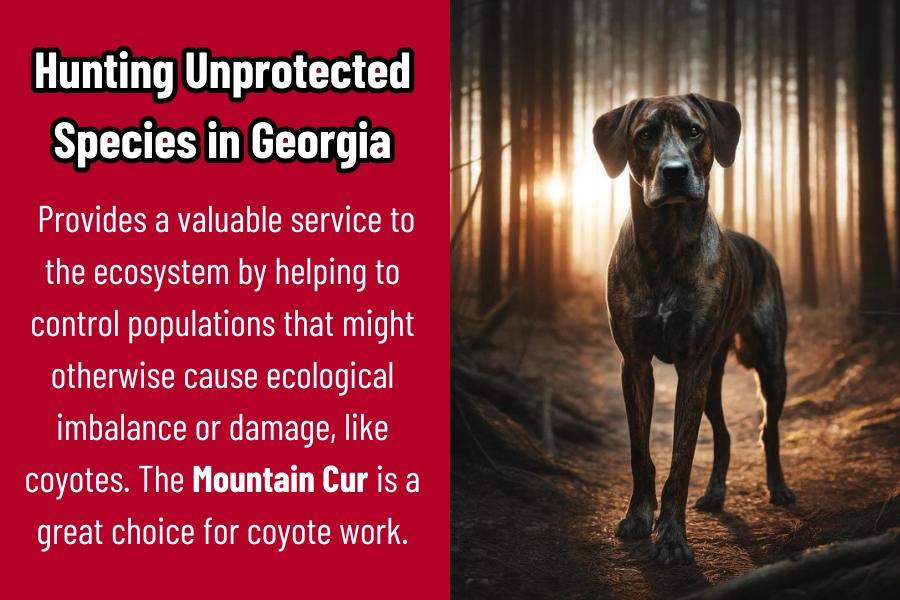
Hunting unprotected species in Georgia offers unique opportunities without the traditional constraints of seasons or bag limits. This includes a variety of animals such as coyotes, armadillos, and nutria, among others. For those interested, in this section we’ll cover key information about hunting unprotected species.
Overview of Unprotected Species
- Species: The list of unprotected species in Georgia includes coyotes, armadillos, groundhogs, beavers, starlings, pigeons, English sparrows, and nutria. These species are considered either invasive or overpopulated, leading to their status where management through hunting is encouraged to control their numbers.
- Habitat and Licenses: These animals are found across a variety of habitats in Georgia. Coyotes and beavers are commonly seen in wooded areas and near water bodies, while armadillos and groundhogs are often found in more open, grassy, or semi-wooded areas. Urban and suburban areas see higher populations of pigeons and starlings. A standard Georgia hunting license is required to hunt these species.
- No Seasons or Bag Limits: There are no closed seasons or bag limits for these species, allowing hunters to manage their populations year-round. This flexibility helps address local issues caused by these animals, such as property damage or impacts on native wildlife.
- Can dogs be used?: Yes, dogs can be an integral part of hunting these unprotected species. They are especially useful in tracking and retrieving game or even flushing animals out during the hunt. For instance, hunting coyotes with the assistance of dogs can be an effective way to manage their populations, and electronic calls are also permitted to attract coyotes.
Hunting with dogs in Georgia, especially when targeting unprotected species, provides a valuable service to the ecosystem by helping to control populations that might otherwise cause ecological imbalance or damage.
Hunters with Dogs: Beware of Alligators in Georgia!
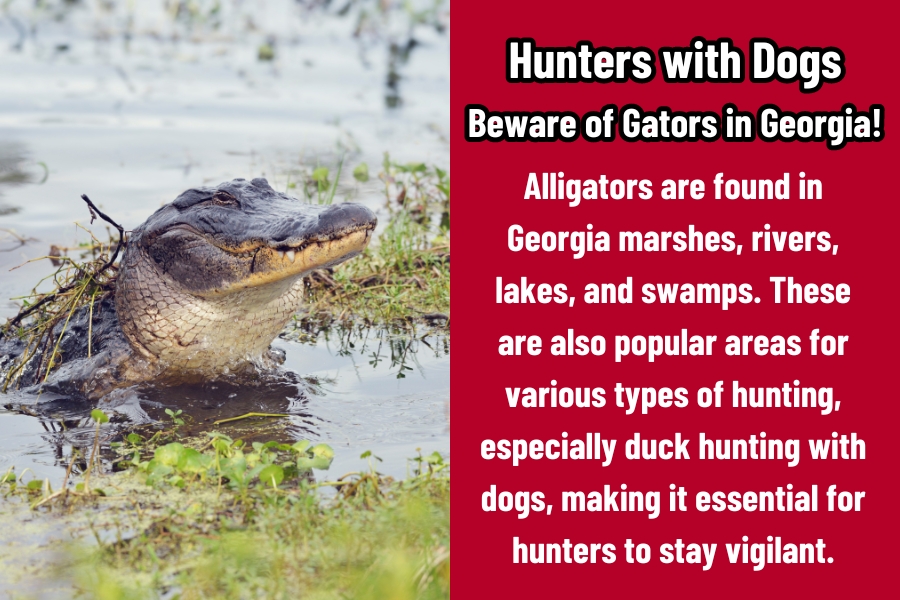
It’s crucial when hunting with dogs in Georgia to consider not just the quarry but also the natural predators that inhabit the same areas—particularly alligators. Alligators are most commonly found in the freshwater environments of Georgia, including marshes, rivers, lakes, and swamps. These areas are also popular for various types of hunting, especially duck hunting with dogs. Alligators can be surprisingly fast and agile in water and even on land, making it essential for hunters to stay vigilant.
Precautions for Hunters with Dogs
Here are some practical tips to ensure safety when hunting in areas that might host alligators:
- Temperature Considerations: Alligators are less active when the water temperature drops, typically in the mid-50s Fahrenheit or colder. During these times, they are less likely to pose a threat as their metabolism slows down, and they eat less. However, this does not mean they are not a danger; it simply reduces the likelihood of an encounter.
- Stay in Running Water: When possible, keep your hunting activities in running water. Alligators prefer still or slow-moving water because it is easier for them to ambush prey.
- Night Hunting Caution: If you are hunting at night, such as when you’re out with a coonhound, extra caution is needed. Make sure to thoroughly scout the area during daylight hours to assess for signs of alligator activity.
- Observe and Inspect: Always inspect your intended hunting area for signs of alligators, such as slide marks on the bank or visible tracks. Seeing these signs should be a clear indicator to choose a different location.
- Be Mindful of Your Dog: Never allow your dog to enter water or explore marshy areas unsupervised. Alligators can and do attack pets, and a dog’s natural movement and noise can attract an alligator’s attention even from a distance.
Hunting in Georgia provides a rich experience full of tradition and the thrill of the chase. However, it also demands respect for nature and an understanding of the environment, especially the presence of alligators.
Wrapping Up the Hunt
As we draw to a close on our comprehensive guide to hunting with dogs in Georgia, let’s take a moment to recap the critical insights and pointers we’ve explored. Whether it’s the thrilling pursuit of big game, the strategic stalking of feral hogs, or the traditional chase of small game, each hunt brings its own set of challenges and rewards.
Imagine standing in the serene woods of Georgia, your trusted canine companion by your side, both of you alert and tuned to the sounds of nature. There’s something deeply gratifying about this partnership—how your dog’s keen senses complement your skills and deepen the hunting experience. It’s this connection, this shared adventure, that keeps the tradition of hunting in Georgia with dogs alive and thriving.
Now, armed with knowledge about the local wildlife, seasons, and necessary precautions—especially regarding safety around alligators—it’s time for you to plan your next outing. Use the insights from this guide to choose the right species, location, and time for your hunt. Whether you’re a seasoned hunter or new to the sport, Georgia’s diverse landscapes and abundant wildlife provide the perfect backdrop for an unforgettable hunting adventure. Get your gear ready, prep your four-legged friend, and set out to create new memories in the great outdoors of Georgia. Happy hunting!
FAQs – Hunting with Dogs In Georgia
Do you Need to Complete a Hunter Education Course to Purchase a Hunting License in Georgia?
Hunting with Dogs in Georgia Answer:
In Georgia, any hunter born on or after January 1, 1961, must complete a hunter education course before they can purchase a hunting license. This requirement ensures that all hunters have the necessary knowledge of legal regulations, wildlife conservation, and safe hunting practices. Georgia recognizes hunter education courses that are certified or mandated by any state wildlife agency or Canadian province, offering flexibility for residents who may have completed their education elsewhere. You can choose to take these courses either online or in a traditional classroom setting, providing convenient options to fit different schedules and learning preferences.
Can you Hunt Big Game in Georgia with Dogs?
Hunting with Dogs in Georgia Answer:
Yes, you can hunt certain big game species with dogs in Georgia, but it’s important to note that the regulations can vary. For example, deer hunting with dogs is allowed but only in specific counties and under strict guidelines to ensure ethical hunting practices. Each county might have different regulations regarding the use of dogs in deer hunting, so it’s crucial to check local laws before heading out.
Can You Hunt Small Game in Georgia with Dogs?
Hunting with Dogs in Georgia Answer:
Absolutely, hunting small game with dogs in Georgia is a popular and widely accepted practice. Species such as rabbits, squirrels, raccoons, and foxes are commonly hunted with the assistance of dogs. Using dogs can enhance these hunting experiences by leveraging the dogs’ abilities to track and retrieve. It’s a tradition that also allows hunters to bond closely with their canine companions, enjoying the outdoors together.
Can You Hunt Feral Hogs in Georgia with Dogs?
Hunting with Dogs in Georgia Answer:
Yes, hunting feral hogs with dogs in Georgia is permitted and is actually quite common. Dogs play a crucial role in managing the population of feral hogs, which are considered invasive and can cause significant damage to the environment and local agriculture. There are no specific seasonal restrictions for hunting feral hogs with dogs on private property, though regulations on public lands like WMAs may differ.
Can You Hunt Migratory Game Birds in Georgia with Dogs?
Hunting with Dogs in Georgia Answer:
Hunting migratory game birds with dogs in Georgia is not only allowed but also highly effective. Species such as ducks, geese, doves, and woodcock are often hunted with the aid of dogs. Dogs contribute significantly to retrieving downed birds and aiding in locating birds in thick cover, making the hunting experience more efficient and enjoyable.
What Species are Unprotected in Georgia and can you hunt them with Dogs?
Hunting with Dogs in Georgia Answer:
In Georgia, several species are designated as unprotected due to their abundance or invasive status, including coyotes, armadillos, groundhogs, beavers, starlings, pigeons, English sparrows, and nutria. These species can be hunted year-round, and there are no bag limits. Using dogs to hunt these species is allowed and can be particularly useful for tracking and retrieval in various terrains. This practice helps manage populations that might otherwise negatively impact local ecosystems and agricultural areas.
Resources
HUNTING WITH DOGS IN GEORGIA: “The regulations, license information, best practices, species, and other key information provided in this post are based on research using the Resource links listed below. While we try to keep the information for this post current, there are no representations expressed or implied, about the completeness, or accuracy of the information provided. Therefore all hunters should always verify current information published by the Georgia Department of Natural Resources before planning a hunt”.
Hunting with Dogs in Georgia – Georgia DNR
Hunting with Dogs in Georgia – Georgia Wildlife
Hunting with Dogs in Georgia – Go Outdoors Georgia
Hunting with Dogs in Georgia eRegulations – Georgia Hunting
Hunting with Dogs in Georgia eRegulations – Hunting Regulations
Hunting with Dogs in Georgia eRegulations – Training Dogs On WMAs & National Forests
Start planning your trip to go hunting with dogs in Georgia. Also check out our other posts about hunting with dogs in…
Alabama
Alaska
Arizona
Arkansas
California
Colorado
Connecticut
Delaware
Florida

